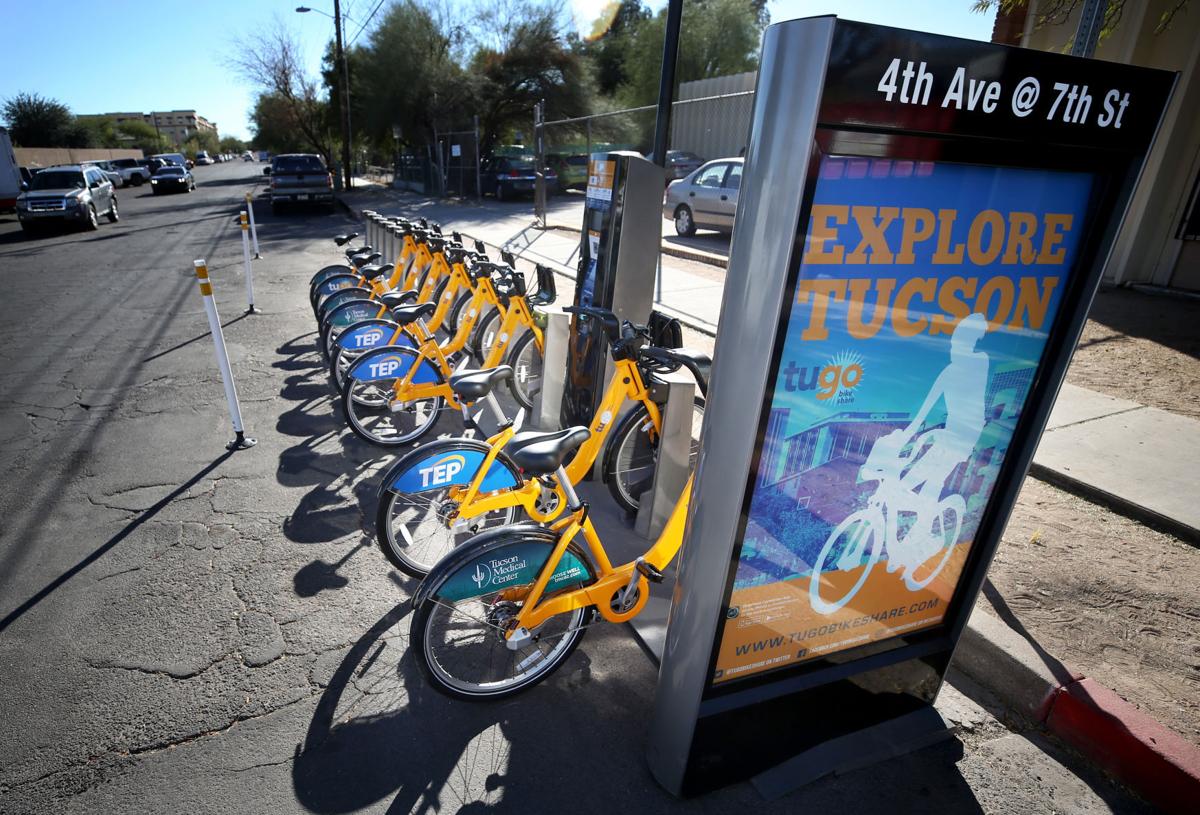If you’re a Tugo bike-share user, you may have noticed some recent changes along Fourth Avenue.
Two of the stations were recently moved a block to make way for the Fourth Avenue Street Fair, held this past weekend, according to Shift Transit officials.
Fred Ronstadt, executive director of the Fourth Avenue Merchants’ Association, which raises a significant amount of money from the semi-annual event, said the stations would have obstructed some of its most lucrative vendors.
“Those are the two prime beer spots for street fair,” Ronstadt said, adding that they bring in around $140,000 in revenue annually.
At its expense, Shift Transit moved the stations, though the plan is to return to their original spots after the street fair, according to city transportation officials. Ronstadt was hoping that change would be permanent, not only because of street fair conflicts but because the stations displaced parking, which many feel is insufficient along the avenue.
“The city and Shift Transit are evaluating usage data at every station and are open to relocating stations or adjusting their size,” Carlos de Leon, the city’s deputy transportation director, told the Road Runner in written comments. “Early usage data shows that the Fourth Avenue bike stations are among the top 10 most-used stations of the 36 stations in the Tugo Bike Share system.”
Ronstadt said the merchants’ association expressed support for the bike-share program early on, but told officials that it wanted station locations to not conflict with the street fair.
“The next thing we knew the stations were installed,” he said, adding that two were in the footprint of the fair.
De Leon said there had been communication with the association about station placement and that its “concerns were taken into account and every effort was made to minimize the parking impact by placing the stations on the side streets adjacent to Fourth Avenue while balancing the needs of the bike-share users to be near desired destinations on Fourth Avenue.”
But Ronstadt isn’t just concerned about the street fair and parking conflicts.
He’s also skeptical of bike-share programs in general, as well as the benefits some say they bring to local businesses near stations, which he has described as “significantly overstated.”
He passed along a November article from The Guardian that detailed the chaos wrought by bike-share systems in China.
Unlike Tugo, which features 36 docking stations centered around the downtown area, the bike-share programs detailed in the article were stationless, resulting in bicycles piling up comically — and disruptively — around the country.
“In general, bike-share programs are interesting,” Ronstadt said. “I think there’s certainly a use for them. I don’t know if the number of bikes that are out there for the community makes sense.”
Tugo is in its infancy, meaning it’s difficult to say anything about usage and what impact — if any — the program is having on local businesses.
However, some research into longer-standing systems shows users enjoy them and many feel businesses do benefit. The largest study reviewed by the Road Runner looked at the Capital Bikeshare program in Washington, D.C., and was based on surveys of 133 businesses and 333 system users.
Twenty-three percent of users said they were likely to spend more at businesses reached by bike share than they would have using other means of transportation, with most of the rest saying they’d spend the same. Among businesses, 10 percent said they had noted an increase in customer traffic as a result of bike share, and roughly 20 percent perceived an increase in sales. Only 1 percent felt sales had declined. Seventy percent felt the program had improved the area surrounding stations.
“Tugo is one of more than 100 communities with bike share systems in the United States,” the city wrote in its response. “In other cities, bike-share systems have had a nearly universal positive economic impact.”
Do you think Tugo bike share will benefit local business?
Kelly Watters, the Food Conspiracy Co-op outreach manager, said it’s difficult to say if Tugo has had any impact on the business so far, though she thinks it could help during events like the gem show, which brings thousands of visitors — many without their own bicycles — to town.
What she’s more certain of is that parking is a major issue for the co-op. When asked what possible expansion features were most important to them, additional car parking came in at a close second behind green-design elements among customers surveyed.
She said the moving of the two stations was a sensible response to a stakeholder’s concerns, and thinks such accommodation is important to the success of Tucson bike share.
“We have to be open to adaptation,” she said, adding that she’s excited about the prospects of bike share.
DeeDee Koenen, with nearby Pop-Cycle, was glad to hear the stations moved for the street fair would be returned to their Fourth Avenue locations, or wherever “they get used more.” She said she thinks the program is a nice addition to the avenue, and that bikes “make a city friendly and quaint.”
“As a sustainable and eco-friendly store, we’re all for bikes,” she said.
She acknowledged the parking concerns of businesses like the co-op, but said her art shop’s customers are “dedicated, and will find a way no matter what happens.”
As to the long-term impact of bike share, she said it just hasn’t been around long enough to say one way or another yet, though she suspects it will be a net positive.
Want to weigh in? A poll accompanies the online version of this story.





